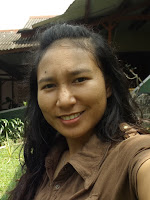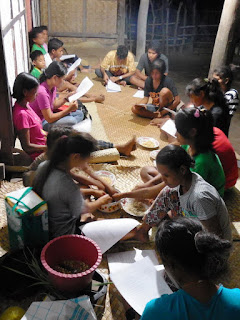Exploring Sumba: Sarloce and Julianti Break the Limit and Share Creativity
Tuesday, 1 December 2015by adminstube
Thirty days in Sumba is a precious opportunity. Not everyone can visit Sumba and enjoy the natural beauty, unique culture and local people’s life. Two students, the activists of Stube-HEMAT Yogyakarta have courage to answer the challenges of Exploring Sumba: adventures to discover new experiences and share the knowledge they have.
 Sarloce Apang, from Buli, East Halmahera, North Maluku is an alumnus of Institute of Technology in Yogyakarta. Loce, she is often called, held socialization of optimizing house yard to plant papaya and tomatoes, practice to make cashew fruit syrup and held discussion with students and activists of Stube-HEMAT Sumba, Waingapu.
Sarloce Apang, from Buli, East Halmahera, North Maluku is an alumnus of Institute of Technology in Yogyakarta. Loce, she is often called, held socialization of optimizing house yard to plant papaya and tomatoes, practice to make cashew fruit syrup and held discussion with students and activists of Stube-HEMAT Sumba, Waingapu. Loce invited young people to optimize house yard by planting papaya and tomatoes. This activity was held at Yulius Anawaru’s house, a Stube-HEMAT Sumba team. Papaya seedlings need special treatment before sowed. They need to be soaked in warm water for 24 hours. After that, prepare the planting media which consist of composted pig manure, goat manure and wood pulp. The planting media is inserted into thirty plastic bags. The next day, papaya seeds that have been soaked was planted in plastic bags and need twelve days to sprout and grow.
Loce invited young people to optimize house yard by planting papaya and tomatoes. This activity was held at Yulius Anawaru’s house, a Stube-HEMAT Sumba team. Papaya seedlings need special treatment before sowed. They need to be soaked in warm water for 24 hours. After that, prepare the planting media which consist of composted pig manure, goat manure and wood pulp. The planting media is inserted into thirty plastic bags. The next day, papaya seeds that have been soaked was planted in plastic bags and need twelve days to sprout and grow. The next activity is a practice to make cashew fruit syrup held in GKS Kanjongan Bakul. Why is cashew? Because cashew is only used as pig food, though actually it contains vitamins that are beneficial for human body. If the fruit is consumed directly, it tastes 'sour' but once processed into syrup, its taste become much more delicious. Ingredients needed were ripe cashew fruit pulp, sugar, salt and lemon. First, the cashew fruit is cut into pieces and then soaked in salt water for four hours, then steamed for 15-20 minutes. After that, blend them until smooth and then filtered. Boil and stir cashew fruit juice plus lemon juice until boiled.
The next activity is a practice to make cashew fruit syrup held in GKS Kanjongan Bakul. Why is cashew? Because cashew is only used as pig food, though actually it contains vitamins that are beneficial for human body. If the fruit is consumed directly, it tastes 'sour' but once processed into syrup, its taste become much more delicious. Ingredients needed were ripe cashew fruit pulp, sugar, salt and lemon. First, the cashew fruit is cut into pieces and then soaked in salt water for four hours, then steamed for 15-20 minutes. After that, blend them until smooth and then filtered. Boil and stir cashew fruit juice plus lemon juice until boiled.Loce also interacted with Child Fund activist who made 'manggulu', a Sumbanese food. She also visited and held a dialogue with the activists of Wahana Visi Indonesia (WVI), a Non Governmental Organization (NGO) that accompany the development of society. Loce discussed problems faced by children and women in Sumba. In relation with student activities, Loce joined a discussion held in GMNI which addressed the need of young generation to turn back to their village and rebuild his village.
 Another participant is Julianti Marbun, an alumnus of the University of Gadjah Mada, who is an activist of Stube-HEMAT Yogyakarta. With her topic about Human Resources, Health and Creativity, Julianti explained that health is related with community healthy lifestyle and development of herb lemongrass. Environment is related with strengthening human resources on lifestyle in healthy environment, like early treatment of malaria utilizing lemongrass. Then, the development of creativity through environmental education was done for children, youth, farmers' groups and members of the church. Strengthening of community management is necessary to maintain the relationship between the community, church and nature.
Another participant is Julianti Marbun, an alumnus of the University of Gadjah Mada, who is an activist of Stube-HEMAT Yogyakarta. With her topic about Human Resources, Health and Creativity, Julianti explained that health is related with community healthy lifestyle and development of herb lemongrass. Environment is related with strengthening human resources on lifestyle in healthy environment, like early treatment of malaria utilizing lemongrass. Then, the development of creativity through environmental education was done for children, youth, farmers' groups and members of the church. Strengthening of community management is necessary to maintain the relationship between the community, church and nature. The community management empowerment was held in Rinjung Pahammu farmers group. The group discussed 'creative and innovative thinking' in developing ideas that produce a work towards creative economy concept. Julianti also introduced a concept of environmental and sanitation education among children with Non Governmental Organization (NGO) World Vision Indonesia (WVI) in Child Protection Agency (LPA), Waingapu. As a student activist, Julianti also held a dialogue with Indonesian National Student Movement (GMNI) activists about conservation of environmental resources and the utilization of local wisdom-based environment.
The community management empowerment was held in Rinjung Pahammu farmers group. The group discussed 'creative and innovative thinking' in developing ideas that produce a work towards creative economy concept. Julianti also introduced a concept of environmental and sanitation education among children with Non Governmental Organization (NGO) World Vision Indonesia (WVI) in Child Protection Agency (LPA), Waingapu. As a student activist, Julianti also held a dialogue with Indonesian National Student Movement (GMNI) activists about conservation of environmental resources and the utilization of local wisdom-based environment.Julianti reminds the students and activists of Stube-HEMAT Sumba who have learned with her to keep their spirit of learning and be creative in applying knowledge and skills usefull for others, especially people of Sumba. (TRU).







